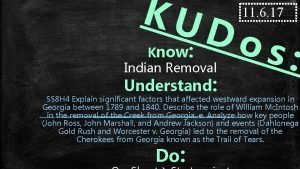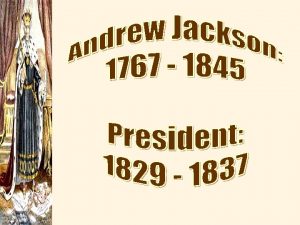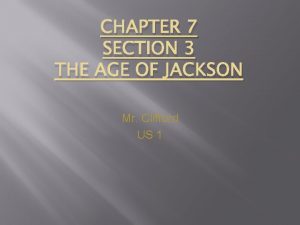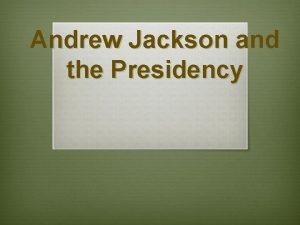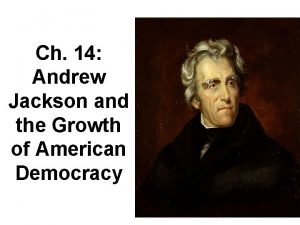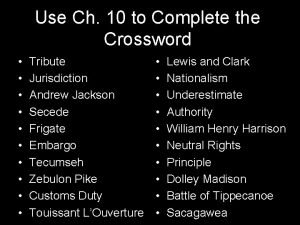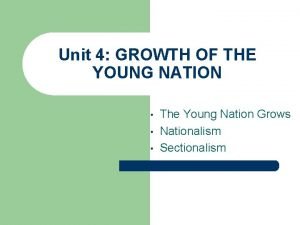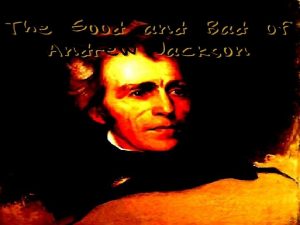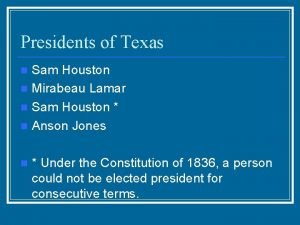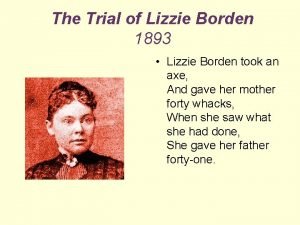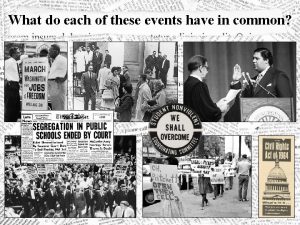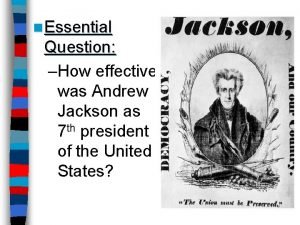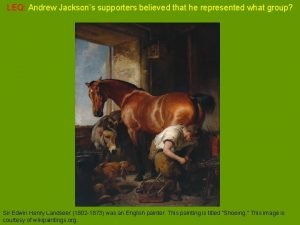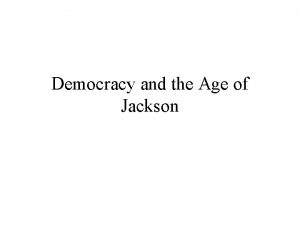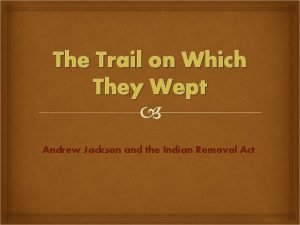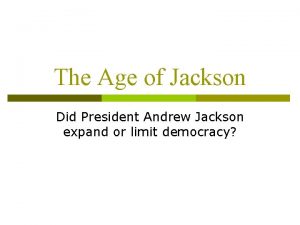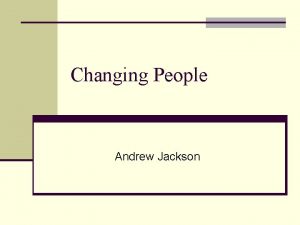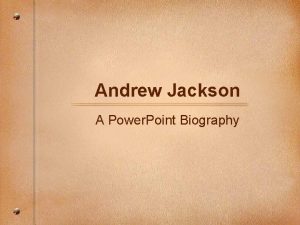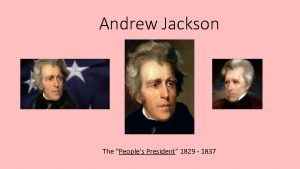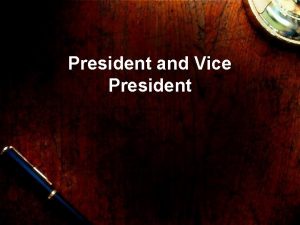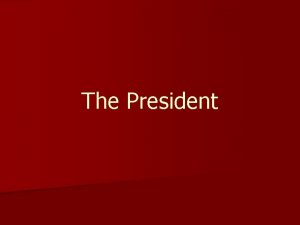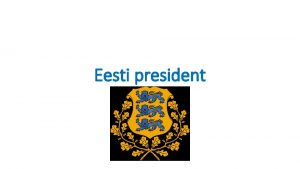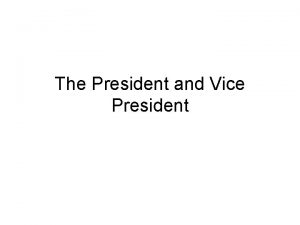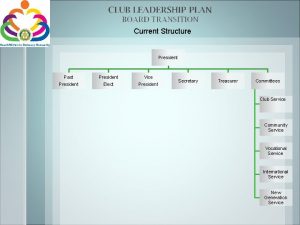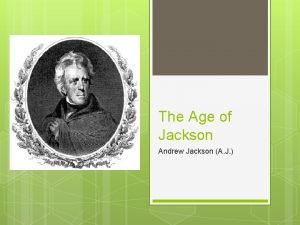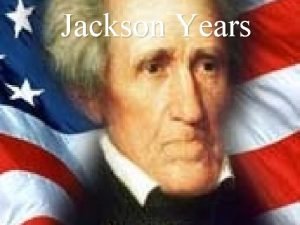Andrew Jackson Andrew Jackson Seventh President of the




















- Slides: 20

Andrew Jackson

Andrew Jackson • Seventh President of the United States • 1829 – 1837 • Four things to know about Jackson - National Bank Veto - Indian Removal Act - Tariff Enforcement - Spoils System

Andrew Jackson • • • Born in the backwoods of North Carolina Received a sporadic (irregular) education But read law Became an outstanding lawyer Prospered (succeeded in material terms)

A War Hero • The first man elected from Tennessee to the House of Representatives and served in the Senate • A major general in the War of 1812 • Became a national hero when he defeated the British at New Orleans

“Old Hickory” • Andrew Jackson’s nickname • He was as tough as wood • And willing to suffer alongside his men

“Let the People Rule” • Voting requirements had changed • States had removed property requirements for voting • All men aged 21 or older could vote

The Spoils System • When Jackson became President, he gave government jobs to his supporters • “To the victor go the spoils” • Government jobs could now go to ordinary men • To the common man

The Spoils System • Believed Government duties could be "so plain and simple" that offices should rotate among deserving applicants

• “It is to be regretted that the rich and powerful too often bend the acts of government to their own selfish purposes. ”

Not a Friend to the National Bank • Did not renew the National Bank’s charter • Felt the National Bank favored the wealthy and the elite • Stated that the National Bank did not loan to the Western farmers • NO to the National Bank

• “There are no necessary evils in government. Its evils exist only in its abuses. ”

The Tariff • A tariff is a tax on an imported good • A tariff raises the prices of foreign goods • A tariff encourages the consumption of the nation’s goods

The South and the Tariff • The South did not produce many industrial goods • The South generally did not like tariffs • A tariff just meant that they might have to buy more expensive goods • A tariff also meant that maybe their crops would be taxed in other countries

The Tariff of Abominations • This was the South’s name for the 1828 tariff • The word abominations means hated

Nullification • The South threatened to nullify the act • Or not obey the federal law in their states • Jackson made it clear that all states had better obey • The tariff was changed and reduced

A Friend to the Farmer and the Common Man • But not the American Indian • The Indian Removal Act of 1830 removed all Native American Indians east of the Mississippi River

The Trail of Tears • Native American Indians were forced to move west of the Mississippi River

Worcester v. Georgia (1832) • The Supreme Court ruled that the Cherokee had a right to their land in Georgia • But Jackson moved them anyway

A Trail of Tears • In the winter of 1837 -38, approximately 15, 000 Cherokee Indians were forced to move from Georgia • On the western voyage, thousands died from starvation and cold temperatures • Jackson was no longer President but his Indian Removal Act led to this tragedy

• “There were ten million Native Americans on this continent when the first non-Indians arrived. Over the next 300 years, 90% of all Native American original population was either wiped out by disease, famine, or warfare imported by the whites. ” ~ Grace Steele Woodward
 Indian removal act
Indian removal act Election of 1824
Election of 1824 Ducks unlimited president
Ducks unlimited president How does this political cartoon depict president jackson
How does this political cartoon depict president jackson Jacksonianism
Jacksonianism When was andrew jackson inaugurated
When was andrew jackson inaugurated The life and legacy of andrew jackson worksheet
The life and legacy of andrew jackson worksheet Andrew jackson crossword puzzle answer key
Andrew jackson crossword puzzle answer key Why did andrew jackson oppose the national bank
Why did andrew jackson oppose the national bank Movie about andrew jackson
Movie about andrew jackson Hoover carts
Hoover carts Champion of the common man
Champion of the common man Sam houston campaign slogan
Sam houston campaign slogan Lizzie borden bridget sullivan
Lizzie borden bridget sullivan Andrew jackson trail of tears quote
Andrew jackson trail of tears quote Albany movement
Albany movement Andrew jackson
Andrew jackson Spoils system
Spoils system Andrew jackson and his supporters believed in apex
Andrew jackson and his supporters believed in apex Andrew jackson found his greatest support among
Andrew jackson found his greatest support among Andrew jackson trail of tears map
Andrew jackson trail of tears map
